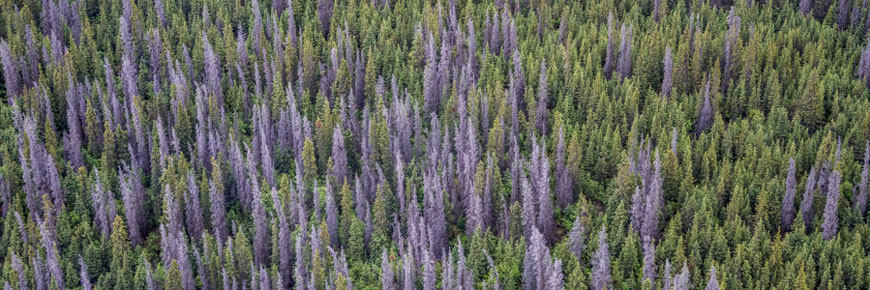
© Royal BC Museum
Restoring forest ecosystems
Kluane National Park and Reserve
Dákeyi ukaanathį̀ jè: All of you watch over our country with your heart
Champagne & Aishihik First Nations (CAFN), Kluane First Nation (KFN), and Parks Canada are working together on Dákeyi ukaanathį̀ jè: All of you watch over our country with your heart – Restoring forest ecosystems in Kluane National Park and Reserve (KNPR). Informed by Indigenous Knowledge and Western science, this multi-year, collaborative project is taking tangible steps towards understanding and increasing the resilience of Kluane’s forests.
Bark beetle outbreak
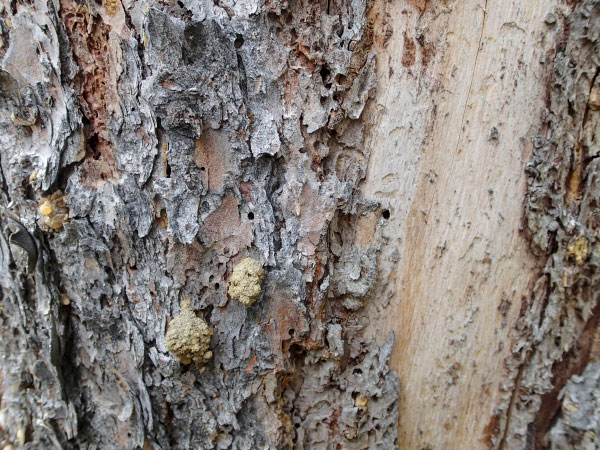
A widespread Spruce Bark Beetle outbreak which began in the early 1990s has had a dramatic impact on the health of KNPR’s forests. The beetles affected two-thirds of the white spruce forests, and nearly half (44%) of the mature spruce forest was killed! Regular visits and monitoring of these impacted forests are helping us understand the long term implication of this disturbance.
Wildfire deficit
A wildfire deficit exists in KNPR (that is, much less area has burned over the last 80 years compared to what we would have expected to burn based on our knowledge of the wildfire regime), likely influenced by various policies of the previous century enacted to suppress natural fire and remove Indigenous cultural practices and access to the land. In 1943, the Government of Canada created the Kluane Game Sanctuary, which denied First Nations access to hunting, fishing and trapping in a significant portion of their traditional territory. Cultural practices on the land, including traditional uses and relationships to fire, were interrupted and altered the cycles of fire in the landscape.
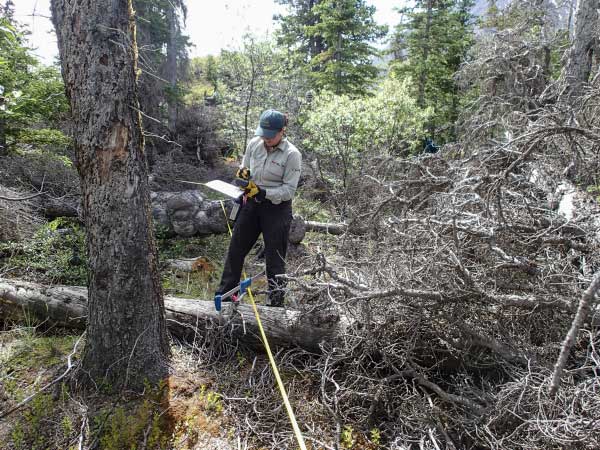
Restoring balance
Fire is an integral natural process for rejuvenating and creating diversity within Kluane’s boreal forests. The younger stands originating from fire help adapt to and absorb impacts from climate change and other stressors. A forest mosaic comprising a variety of stand ages and plant communities is generally more resilient in the face of major insect infestations and catastrophic fire events. With this project, our hope is to start the process of restoring balance to our forests and increase their ability to withstand and recover from past and future changes.
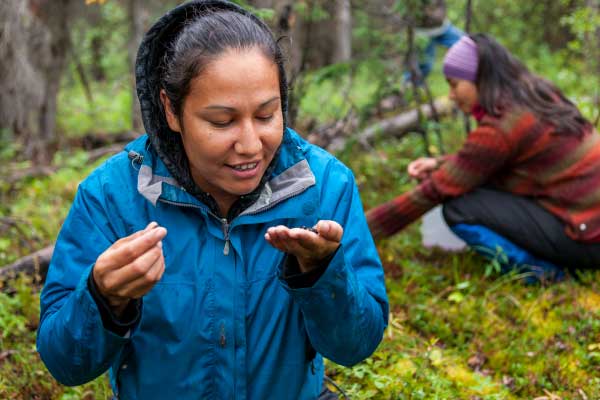
This project will help us plan long-term approaches to restoring and increasing the resilience of the park’s forests while helping to revitalize Southern Tutchone traditions and culture.
Safety
Safety is always Parks Canada’s top priority when planning prescribed fire.
Parks Canada does prescribed fires on Parks Canada administered lands to help restore and maintain ecological integrity and biodiversity, to promote ecosystem conservation and restoration, and to reduce the risk of wildfire to nearby communities. Parks Canada takes wildfire prevention and risk reduction very seriously and carries out activities, in collaboration with communities located inside and near Parks Canada administered places, to prevent and reduce the risk of wildfires. Prescribed fires are one tool that Parks Canada uses to reduce the risks. Prescribed fires help lessen the buildup of plant materials that can fuel and help sustain wildfires. Removing plant materials from around communities can help to reduce the intensity and severity of wildfires, slows their spread, and makes them easier to control or extinguish. Additionally, prescribed fires help to support healthy ecosystems that are resilient to the impacts of climate change and invasive plant and insect species. In turn these, ecosystems are more resilient to the impacts of wildfires.
Members of Parks Canada’s National Fire Management Program carry out extensive planning and preparation before a prescribed fire is lit, including evaluating the landscape and assessing weather conditions and windspeed. At Parks Canada-administered places, prescribed fires are planned and managed by well-trained, professional wildland fire management specialists and are only set under specific, pre-determined conditions. Since 1983, there have been 529 prescribed fires conducted by Parks Canada across the country.
November 2024 update
Alder Creek prescribed fire overview
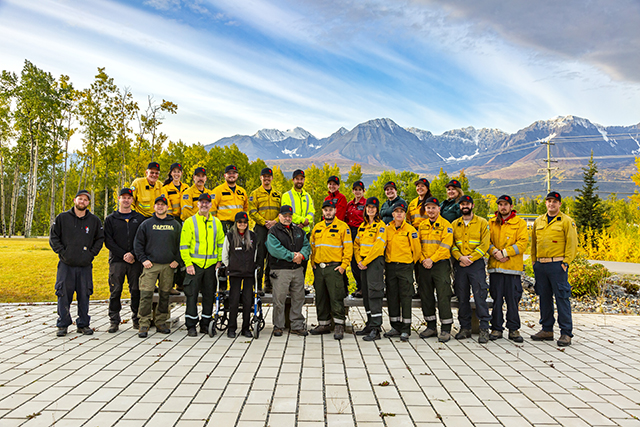
After careful preparation and planning the Alder Creek prescribed fire went ahead on September 11, 2024, with two test fires ignited in the burn unit. After observing the fire behaviour from these test fires operational staff opted to cease further ignition due to less-than-optimal results. We would like to thank Champagne and Aishihik First Nations (CAFN), Yukon Wildland Fire Management (WFM) and, the Canadian Forest Service (CFS) for all your work on the Alder Creek prescribed fire! Together we have taken an important step towards putting fire back on the landscape in a safe and controlled way.
Prescribed fire operation
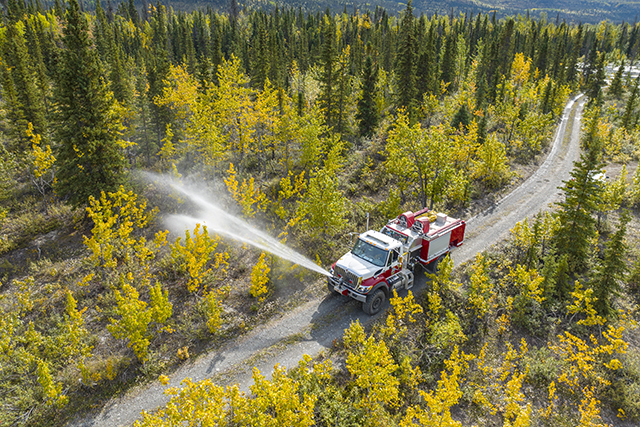
An incident management team convened in Dakwäkäda (Haines Junction) on Monday, September 9. The team consisted of Parks Canada, CAFN and Yukon Wildland Fire Management members. Over the week, local fire crews prepared the Alder Creek prescribed fire site by laying hose, wetting down areas, clearing brush and setting up pumps.
The ignition was started by a heli-torch, assisted by ground crews with drip torches. One helicopter was used for ignition with another on stand-by. Lookouts were stationed above the site to observe any spread. After the test fires, the site was monitored for hot spots. Monitoring is done by physically checking the area and through drone imagery that uses infrared imaging to highlight hot zones.
GO/NO GO checklist
Strict conditions must be met before any prescribed fire takes place. The prescribed fire plan describes the range of acceptable conditions needed before ignition occurs. This includes:
- wind speed
- barriers to fire spread
- resources needed before, during, and after the burn (including personnel)
- fuel type in surrounding area
Next steps
The primary objectives of the Alder Creek prescribed fire were to gain an understanding of fire behaviour in forests affected by the spruce bark beetle to address the park's fire deficit and, to build local capacity in the fire management program. Completing this project is a priority in the coming years as an important first step to advance the fire management program in Kluane NPR and contribute to greater landscape and ecological objectives.
During the winter, Parks Canada staff will continue to work with Champagne and Aishihik, and Kluane First Nations to investigate potential future prescribed fire sites.
The collaborative work putting fire on the ground has set a precedent for prescribed fire in Kluane National Park and Reserve. Continued use of prescribed fire helps with ecosystem restoration and promotes long-term health in the boreal forest.
We want to hear from you! Please contact us with any thoughts, concerns, or questions!
Email: kluaneinfo@pc.gc.ca
Phone: 867-634-7250
DÁKEYI UKAANATHĮ̀JÈ COMMUNITY NEWSLETTER November 2024
(PDF, 780 Kb)
For more information on prescribed fire in National Parks, check out:
- https://www.pc.gc.ca/en/nature/science/conservation/feu-fire/feuveg-fireveg/dirige-prescribed
- Prince Albert NP: https://www.youtube.com/watch?v=1coJqyxOeb0
- Banff NP: https://www.youtube.com/watch?v=xxvC6MPhu9I
- Pukaskwa NP: https://www.youtube.com/watch?v=Jyk5H0KSFnw
- Terra Nova NP: https://www.youtube.com/watch?v=tAwzQVrl3QY
Related links
- Date modified :